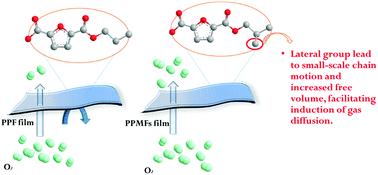当前位置:
X-MOL 学术
›
Soft Matter
›
论文详情
Our official English website, www.x-mol.net, welcomes your feedback! (Note: you will need to create a separate account there.)
Influence of asymmetric substituent group 2-methyl-1,3-propanediol on bio-based poly(propylene furandicarboxylate) copolyesters.
Soft Matter ( IF 3.4 ) Pub Date : 2019-11-19 , DOI: 10.1039/c9sm02081k Zhi-Yu Yang 1, 2, 3, 4, 5 , Chin-Wen Chen 1, 2, 3, 4, 5 , Syang-Peng Rwei 1, 2, 3, 4, 5
Soft Matter ( IF 3.4 ) Pub Date : 2019-11-19 , DOI: 10.1039/c9sm02081k Zhi-Yu Yang 1, 2, 3, 4, 5 , Chin-Wen Chen 1, 2, 3, 4, 5 , Syang-Peng Rwei 1, 2, 3, 4, 5
Affiliation

|
A series of bio-based poly(propylene-co-2-methyl-1,3-propanediol 2,5-furandicarboxylate) (PPMF) copolyesters, with various compositions from poly(propylene 2,5-furandicarboxylate) (PPF) to poly(2-methyl-1,3-propylene 2,5-furandicarboxylate) (PMePF), were synthesized by conventional melt polymerization. The effects of the substituent group to PPF on the thermal properties, mechanical properties, and gas barrier properties were analyzed by differential scanning calorimetry (DSC), thermogravimetric analysis (TGA), dynamic mechanical analysis (DMA), tensile testing, and the oxygen permeation test. The introduction of the methyl group with a hydrogen atom altered the thermal behavior and gas barrier properties of copolyesters, suggesting that the glass temperature (Tg) and the melting temperature (Tm) were decreased as the 2-methyl-1,3-propanediol (MPO) content increased. PPF exhibited the highest Tm and Tg of 175.9 °C and 83.0 °C with a melting enthalpy (ΔHm) of 38.6 J g−1, and poly(2-methyl-1,3-propylene 2,5-furandicarboxylate) formed as an amorphous polyester. Moreover, the effect of a substituent methyl group on the barrier properties was attributed to β relaxation and fraction free volume, which could be raised by replacing the methyl group with a hydrogen atom for PPF, weakening the barrier properties.
中文翻译:

不对称取代基2-甲基-1,3-丙二醇对生物基聚呋喃二甲酸丙烯酯共聚酯的影响。
一系列生物基聚(丙烯-共-2-甲基-1,3-丙二醇2,5-呋喃二羧酸酯)(PPMF)共聚酯,与由聚对聚各种组合物(丙烯2,5-呋喃二羧酸酯)(PPF)通过常规的熔融聚合反应合成(2-甲基-1,3-丙烯2,5-呋喃二甲酸二甲酯)(PMePF)。通过差示扫描量热法(DSC),热重分析(TGA),动态力学分析(DMA),拉伸试验和氧渗透分析了取代基对PPF的热性能,机械性能和阻气性能的影响。测试。甲基与氢原子的引入改变了共聚酯的热性能和阻气性,表明玻璃温度(T g)和熔融温度(T m)随着2-甲基-1,3-丙二醇(MPO)含量的增加而降低。PPF的最高T m和T g分别为175.9°C和83.0°C,熔融焓(ΔH m)为38.6 J g -1,聚(2-甲基-1,3-丙烯2,5-呋喃二甲酸) )形成为无定形聚酯。此外,取代基甲基对阻挡性能的影响归因于β松弛和无分数体积,这可以通过用PPF的氢原子取代甲基来削弱阻挡性能来提高。
更新日期:2019-11-19
中文翻译:

不对称取代基2-甲基-1,3-丙二醇对生物基聚呋喃二甲酸丙烯酯共聚酯的影响。
一系列生物基聚(丙烯-共-2-甲基-1,3-丙二醇2,5-呋喃二羧酸酯)(PPMF)共聚酯,与由聚对聚各种组合物(丙烯2,5-呋喃二羧酸酯)(PPF)通过常规的熔融聚合反应合成(2-甲基-1,3-丙烯2,5-呋喃二甲酸二甲酯)(PMePF)。通过差示扫描量热法(DSC),热重分析(TGA),动态力学分析(DMA),拉伸试验和氧渗透分析了取代基对PPF的热性能,机械性能和阻气性能的影响。测试。甲基与氢原子的引入改变了共聚酯的热性能和阻气性,表明玻璃温度(T g)和熔融温度(T m)随着2-甲基-1,3-丙二醇(MPO)含量的增加而降低。PPF的最高T m和T g分别为175.9°C和83.0°C,熔融焓(ΔH m)为38.6 J g -1,聚(2-甲基-1,3-丙烯2,5-呋喃二甲酸) )形成为无定形聚酯。此外,取代基甲基对阻挡性能的影响归因于β松弛和无分数体积,这可以通过用PPF的氢原子取代甲基来削弱阻挡性能来提高。


























 京公网安备 11010802027423号
京公网安备 11010802027423号